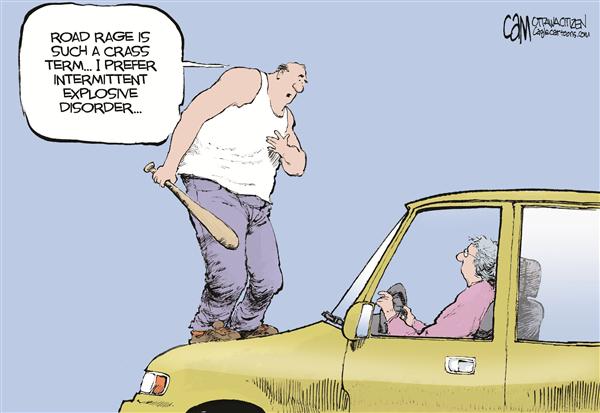|
Thanks for visiting - 2023 marks our 20th anniversary! This site is ad-free and supported by sales of our online courses. If you get value from what we write, click the link at the bottom of the page and read Day 1 of "Your inner narrative" to see if it's right for you...no email required. That person pissed me off!We've all been in situations where someone or something made us angry. For example, someone cuts you off in traffic. What do you do? Reactions range from saying something under your breath, to yelling, honking, and making rude hand gestures. The issue is, how you react might affect your state of being for some time. You can probably recall a situation that caused you to become caught up in thoughts and emotions, leading to a reaction that subsequently dictated your mood for hours. Maybe it ended up ruining your entire day! When you reflect on it, you can ask yourself "Did I really have a bad day, or a few bad moments that I dwelled on for the entire day?" More often than not, it's the latter. But, figuring that out after the fact doesn't help a lot. Back to our example - someone cutting you off in traffic may result in the following:
Examples aren't relegated to road rage - daily life is full of them. Maybe a significant other, friend, or acquaintance said something that "rubbed you the wrong way." Or, perhaps someone was purposefully rude to you. Maybe you were treated unfairly by a co-worker or random stranger! We all encounter these situations on a regular basis. And, much to our own detriment, most of us let them affect our outlook on life more than (and, longer than) we should. We let them influence our communication with others, our decisions and actions, our productivity, and - ultimately - our happiness and well-being. The ironic thing is, the person who cut you off in traffic, was rude to you, or said something that offended you will usually go about THEIR day oblivious to the fact that they are controlling everything about YOUR day. Reacting vs. respondingReacting is when you let thoughts and emotions take over, and you get lost in the compulsive mental activity that ensues. This results in the common cliches:
It's the easy path, and there is always someone (or something) to blame for your behavior: "I acted that way because I was pissed about what happened to me earlier!" Responding, on the other hand, means we take action to address what can be addressed. Once we do this, we let go and move on. For example, if someone cuts you off in traffic, take appropriate action to ensure you're not going to have an accident. When you are sure you're safe, let go of the mental drama - let go of the stories your mind is churning out - and move on with your day. Don't carry around the burden of irritation and anger, because that burden only affects you - it does nothing to the person you are irritated or angry at. Think about this for a minute: you are mad at someone else, but you adopt a state of being (outlook, behavior, actions) that only affects you and makes your life (and the lives of those around you) more difficult. If you fully understand and internalize this, you realize it's insanity to continue functioning this way. An easy way to remember the distinction between reacting and responding is to think about your doctor prescribing medication to you:
Responding isn't the easiest path. To respond, you have to reverse a lifetime of conditioning that culminates in habitual actions and reactions. Alright - how do I do it then?How do you avoid getting lost in thoughts and emotions? How do you keep from dwelling on situations, and letting them affect you long after they happen? How do you just "let go" and move on? You do so by strengthening awareness of thoughts, emotions, and urges as they start to arise. This process is known as mindfulness - it comes from developing the skill of observing your mind and its activity without getting caught up in it. How do you develop this skill? Through the dedicated exercise of meditating. Together, mindfulness and meditation help you avoid the conditioned behavior you've historically been victim to. They allow you to create space between the situation, and thoughts and emotions about the situation. This space is what you need in order to respond appropriately (as opposed to reacting mindlessly). As Viktor Frankl said, Between the stimulus and the response there is a space, and in this space lies our power and freedom. It isn't a transformation that happens instantly - as mentioned above, you are reversing a lifetime of conditioning. And, it requires effort on your part. If you put forth that effort, however, the results can be life-changing. In addition to helping you respond instead of react, mindfulness and meditation address the struggles we all deal with every day:
<>
Our minds constantly create stories about what we experience, and we spend most of our time caught up in those stories. This results in the stress and struggles of daily life. "Your inner narrative" (our 15-day online course) can help you break that pattern. Read Day 1 here (no email required). Comments are closed.
|
